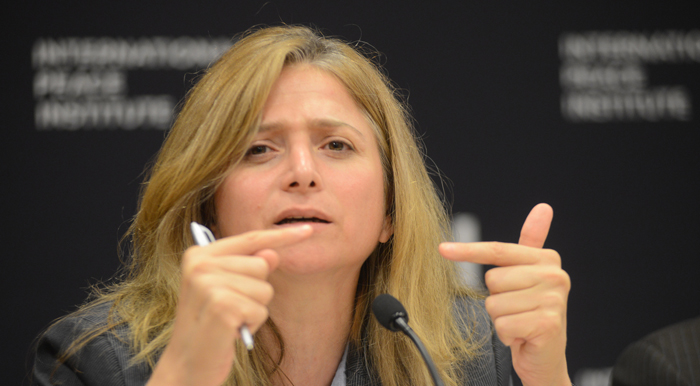
“I believe that there is a lot of ambiguity and a lot of facts that are being sidelined and hidden, and are presented to you in an incomplete way,” said acclaimed Syrian writer Samar Yazbek, talking about the Syrian conflict during an IPI Arab Intellectuals Series event on September 13, 2012. “In Syria, the cultural scene has been blacked out. I don’t know if any of you know the name of a Syrian writer.”
Ms. Yazbek, who is from an Alawite family, disputed notions that the Syrian revolution started violently and with sectarian aims: “When we would go out on demonstrations, we would be accompanied by Christians… there would be Kurds, Sunnis, all sects would be represented… There was no single religious sect that would emerge.”
Dr. Max Weiss, a Princeton Professor of History and Near Eastern Studies who translated Ms. Yazbek’s latest book, A Woman in the Crossfire: Diaries of the Syrian Revolution, added, “The diversity of Syria–it’s religious diversity, it’s ethnic diversity, it’s ideological diversity–is one of the most powerful assets in their national arsenal.”
In his opening remarks, Ambassador Abdullah M. Alsaidi, IPI Senior Fellow, said Ms. Yazbek “was not just a witness or a journalist, she was part of the uprising. That is why I think we have to take whatever she says very seriously.”
Ms. Yazbek said, “I saw first-hand things that for a long time I could not believe happening in Syria: a group of people carrying civilian signs that are non-sectarian, carrying flowers, carrying olive branches, and demanding a democratic state… However, what happened was that the Syrian regime brought the army in and commanded the army members to kill people.”
She said, “Whoever supported the revolution was imprisoned, or killed, or terrorized, or had their reputation defamed, or was pursued, or their family was persecuted in order to force them away from the streets.
“As for weapons, [the government] said that there are armed groups. They said this from day 1, from the very first day of the peaceful demonstration when I saw them carrying the olive branches and how they were killed while they were unarmed. They were no arms in Syria. There were no armed gangs except for Bashar al-Assad’s armed gang.”
Sergey P. Yakushev, Second Secretary from the Permanent Mission of the Russian Federation to the United Nations, challenged Ms. Yazbek’s view of the revolution. “I met some refugees from Syria,” he said, “and they told me that in the beginning, they supported the revolution with their heart and soul. But the events went on, and they said that they had to flee the country. From their point of view, the revolution in Syria is over… the revolution is over, and it was a failure. Now there is a war.”
In her response, Ms. Yazbek defended the revolutionary causes, saying, “It is a revolution with problems, but it is a revolution. The Syrians will not go back, even if the entire world abandons them.”
Ms. Yazbek explained, “There have been incidents of violence in the revolution because violence begets violence, and violence begets its own monopolies and its own kind of economy. Weapons also beget an arms trade, as well as warlords, etc. But all these actions were isolated actions that did not become a sectarian situation or sectarian trend despite the presence of tensions.”
Ms. Yazbek pointed out that international action was being stymied by national rivalries. “I believe that there is very strong international sympathy with the Syrian people,” she said. “But politics are pragmatic, and morals always take a backseat to interests.”
“There is a game of interests being played by all these states: the Americans, the Russians, the Chinese, the Iranians… there are national interests that are fighting each other in Syria, each one funding a certain side in Syria, and this is truly frightening.”
She added, “We have a massacre that’s going on live on the air in front of the entire world… Syrian blood is now a spectacle.”
Ms. Yazbek acknowledged that the transition will not be easy. “The departure of Bashar al-Assad is not the purpose of the revolution, but it is an urgent requirement that the world must realize… His removal will be the key to the door of future civil society. For us to cross that threshold, we will go through a lot of chaos.”
The event was moderated by Ambassador Abdullah M. Alsaidi, IPI Senior Fellow.
![]() Download this text as a meeting brief
Download this text as a meeting brief
Related News:
Branded a Betrayer for Embracing Syria’s Rebels (New York Times, November 23, 2012)
Watch event:







